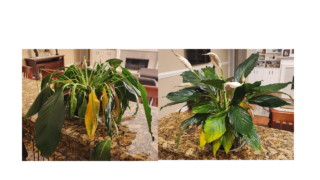A plant tale of H2O deprivation – Wait! What about humans?

I’ve been known to kill plants faster than anyone else. I love the plants in my yard and my flowerpots, but I lack the discipline to take care of them consistently. I’m not proud of it, and I’m trying to be better at it.
Recently, I received a beautiful white peace lily plant from a friend. I took good care of it until I went on vacation for 2 weeks. I asked someone to water it a couple of times, but it didn’t happen as planned. When I came back home, I found a sad, droopy, saggy plant. I thought it was dead, but I watered it anyway.
By the second day, it came alive like nothing bad had happened. I was so surprised and happy to have my plant back!
Human dehydration is similar to plants but recovering from it can be quite different. If you suffer severe dehydration, your body reaches a critical state, and medical intervention is necessary to restore the balance of fluids and electrolytes.
Prevention is key, and you want to ensure adequate fluid intake daily. You may pay special attention to situations likely to cause dehydration such as increased physical activity, exposure to high temperatures, or fluid loss due to excessive sweating, vomiting, or diarrhea.
The amount of water you should drink each day can vary depending on your age, sex, activity level, overall health, and environmental conditions. There is no one-fits-all amount but in general we suggest drinking eight 8-ounce glasses of water per day, or roughly 2 liters. Personally, I usually drink 3-4 liters of water per day.
A good way to check whether you’re drinking enough water is by your urine color. If your urine is dark-colored, it may indicate that you need to drink more fluids. Conversely, if your urine is pale yellow or almost clear, it generally suggests adequate hydration.
If you rely on your feeling of thirst for cues to drink water, remember that several factors may interfere with your thirst sensors:
- As you age, your sensory receptors responsible for detecting thirst may become less sensitive.
- Some medications can affect your thirst sensation by altering your normal feedback mechanisms that regulate thirst.
- Some medical conditions such as diabetes, kidney disease, or hormonal imbalances, can affect fluid balance in the body and interfere with the thirst sensation.
Drinking fluids regularly, even when not feeling thirsty, can help prevent dehydration. Monitoring fluid intake, using reminders, and consuming hydrating foods like fruits and vegetables can also be beneficial.
If you’re concerned about proper hydration consult your healthcare provider for personalized recommendations based on your specific needs and circumstances.
I’m here for you!


